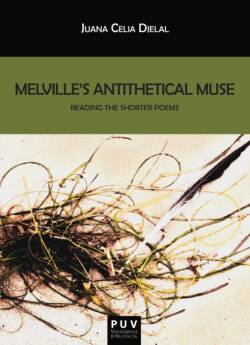Читать книгу Melville's Antithetical Muse - Juana Celia Djelal - Страница 9
На сайте Литреса книга снята с продажи.
ОглавлениеPrefatory Note
and Acknowledgements
My first encounter with Melville’s poetry provoked wonder at not having known such a corpus existed. Curiosity about its neglect led to investigations that have resulted in this volume. This study examines Melville’s oppositional poetics, the contrariety of his approach to writing poetry distinct from the orthodox expectations in the U.S. of the late-nineteenth century. The poems discussed here, selected from the three collections of poetry published in Melville’s lifetime, reflect his oppositional stance. Though the purview of this study does not include Melville’s longest poem, the 18,000 verse Clarel, readings of several lengthy poems are included.
The poems have engaged the interest of scholars, largely since the 1990s and generally in the context of nineteenth-century studies or broader studies of U.S. poetry. Books dedicated exclusively to Melville’s poetry are few. This study, with its focus on topical, thematic, rhetorical and technical aspects of poems from Battle-Pieces and Aspects of the War, John Marr and Other Sailors with Some Sea Pieces, and Timoleon Etc., hopes to expand interest in the poems and widen their readership.
* * * *
My heartfelt thanks to Carme Manuel, editor extraordinaire of Biblioteca Javier Coy d’estudis nord-americans, whose warm congeniality and enthusiasm would have found resounding favor with Melville. The sun smiled brightly the day she revealed that she had translated Melville’s Battle-Pieces to Catalan, “sotmesos a un millor domini / que el domini d’un mateix.” And to Dra. Carmen González, U.S. historian, enduring gratitude for a serendipitous introduction that has made a mark on work and friendships.
I am most grateful to the cordial librarians of The Newberry Library, Chicago, The New York Public Library, and Houghton Library, Harvard University, for their proficient and courteous assistance.
Warm thanks to the colleagues in Melville studies, and especially to John Bryant, Paweł Jędrzejko, Wyn Kelley, Giorgio Mariani, Sandy Marovitz, Gordon Poole and Basem Ra’ad for their support of my work over the years. And to those Melvilleans, remembered and revered, generous in spirit and deed, whose conversation and enthusiasm for my investigations, in their incipient stages and beyond, has served as professional and personal boon exceeding the limit of their days: Hennig Cohen, Harrison Hayford, Jill Barnum (Gidmark), Stanton Garner and Douglas Robillard.
Beyond earthly chronometrics, I am indebted to Allen Mandelbaum for his arts of poetry, cicerone through landscapes of Vergil, of Dante, who once confided––In the next life, a jazz musician, a basketball player––Eternal master, now, of beat and bounce.
It is a pleasure to acknowledge those friends and colleagues whose good cheer, interest and appreciation of this project have made pleasurable labors even more gratifying: Rafael Alenda, Barbara Alfano, Helena Buescu, Jack Catlin, Greta Cune, Jill Derickson, Nergis Erturk, Carmen González, Paul Harvey, Tawny Holm, John Kirby, Brian Lennon, Renae Mitchell, Leonard Neufeldt, Gonzalo Rubio, Manini Nayar Samarth.
My deepest gratitude to Aixé Sophia Djelal, a patient, loving spirit above all others, downright hilarious besides, and to Matt Proctor, master of harmonies and multiple harmonics.
Of the innumerable ways in which I might acknowledge Djelal Kadir, friend in the profound etymological sense, best here to prefer an elegant solution: Pace tua Alighieri/Guinizzelli, I inscribe these labors to “il miglior fabbro”: “leu sui Arnaut qu’amas l’aura: E chatz le lebre ab lo bou: E nadi contra suberna.”
